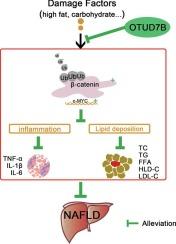OTUD7B 通过抑制 K48 链接的泛素化和β-catenin 的降解来抑制非酒精性脂肪肝的肝损伤。
IF 4.2
2区 生物学
Q2 BIOCHEMISTRY & MOLECULAR BIOLOGY
Biochimica et biophysica acta. Molecular basis of disease
Pub Date : 2024-11-08
DOI:10.1016/j.bbadis.2024.167555
引用次数: 0
摘要
非酒精性脂肪肝(NAFLD)是一种流行的肝病。含卵巢肿瘤结构域的7B(OTUD7B)是一种去泛素化酶,它在非酒精性脂肪肝中的作用尚不清楚。在高脂饮食(HFD)诱导的非酒精性脂肪肝小鼠模型和棕榈酸(PA)处理的 HepG2 细胞中,OTUD7B 的表达量减少。腺病毒过表达 OTUD7B 会导致小鼠体重减轻和肝损伤,并降低血清转氨酶(ALT)和天冬氨酸转氨酶(AST)水平。过表达 OTUD7B 可减轻肝脏脂质沉积(血清 TG、TC、LDL-C、HDLC 和 FFA 水平),这可能是通过抑制脂肪生成和 β 氧化相关基因实现的。在非酒精性脂肪肝小鼠中过表达 OTUD7B 后,肝脏炎症因子(TNF-α、IL-6 和 IL-1β)的含量降低。一项机制研究表明,OTUD7B过表达的保护作用可能与β-catenin信号激活有关。在TopFlash试验中,OTUD7B的过表达促进了PA诱导的β-catenin活性,并增加了细胞中总β-catenin和c-myc的水平。β-catenin水平的增加是由于OTUD7B通过抑制与K48连接的泛素化和蛋白酶体降解而稳定了β-catenin水平。NR4A2 在 NASH 中的作用已得到证实。NR4A2 ChIP-seq和RNA-seq数据排除了NR4A2对OTUD7B的转录调控,实验证明NR4A2与OTUD7B启动子区域结合并正转录调控OTUD7B的表达。综上所述,OTUD7B的过表达可改善非酒精性脂肪肝的肝脏炎症和脂肪变性。OTUD7B的作用机制可能是通过消除K48连接的泛素化来抑制β-catenin的降解,而β-catenin的降解可能受到NR4A2的调控。本文章由计算机程序翻译,如有差异,请以英文原文为准。

OTUD7B inhibited hepatic injury from NAFLD by inhibiting K48-linked ubiquitination and degradation of β-catenin
Non-alcoholic fatty liver disease (NAFLD) is the prevalent liver disease. Ovarian tumor domain-containing 7B (OTUD7B) is a deubiquitinating enzyme and its role in NAFLD remains unclear. In high-fat diet (HFD)-induced NAFLD mouse model and palmitic acid (PA)-treated HepG2 cells, OTUD7B expression was decreased. Adenoviral overexpression of OTUD7B in mice resulted in reduced body weight and liver injury, with decreased serum aminotransferase (ALT) and aspartate aminotransferase (AST) levels. OTUD7B overexpression attenuated hepatic lipid deposition (serum TG, TC, LDL-C, HDL![]() C, and FFA levels), which might be through the suppression of lipogenesis and β-oxidation-related genes. The contents of hepatic inflammatory factors (TNF-α, IL-6, and IL-1β) were decreased following OTUD7B overexpression in NAFLD mice. A mechanism study indicated that the protective effect of OTUD7B overexpression might be associated with β-catenin signal activation. OTUD7B overexpression promoted PA-induced β-catenin activity in TopFlash assay, and increased total β-catenin and c-myc levels in cells. The increase in β-catenin levels was contributed to the stabilization via inhibiting K48-linked ubiquitination and proteasomal degradation by OTUD7B. NR4A2 role in NASH has been proved. NR4A2 ChIP-seq and RNA-seq data excluded transcriptional regulation of NR4A2 to OTUD7B, and it was experimentally evidenced that NR4A2 bound to OTUD7B promoter region and positively transcriptionally regulate OTUD7B expression. In summary, OTUD7B overexpression ameliorated hepatic inflammation and steatosis in NAFLD. The possible mechanism of OTUD7B might be through the inhibition of β-catenin degradation by removing K48-linked ubiquitination, which might be regulated by NR4A2.
C, and FFA levels), which might be through the suppression of lipogenesis and β-oxidation-related genes. The contents of hepatic inflammatory factors (TNF-α, IL-6, and IL-1β) were decreased following OTUD7B overexpression in NAFLD mice. A mechanism study indicated that the protective effect of OTUD7B overexpression might be associated with β-catenin signal activation. OTUD7B overexpression promoted PA-induced β-catenin activity in TopFlash assay, and increased total β-catenin and c-myc levels in cells. The increase in β-catenin levels was contributed to the stabilization via inhibiting K48-linked ubiquitination and proteasomal degradation by OTUD7B. NR4A2 role in NASH has been proved. NR4A2 ChIP-seq and RNA-seq data excluded transcriptional regulation of NR4A2 to OTUD7B, and it was experimentally evidenced that NR4A2 bound to OTUD7B promoter region and positively transcriptionally regulate OTUD7B expression. In summary, OTUD7B overexpression ameliorated hepatic inflammation and steatosis in NAFLD. The possible mechanism of OTUD7B might be through the inhibition of β-catenin degradation by removing K48-linked ubiquitination, which might be regulated by NR4A2.
求助全文
通过发布文献求助,成功后即可免费获取论文全文。
去求助
来源期刊
CiteScore
12.30
自引率
0.00%
发文量
218
审稿时长
32 days
期刊介绍:
BBA Molecular Basis of Disease addresses the biochemistry and molecular genetics of disease processes and models of human disease. This journal covers aspects of aging, cancer, metabolic-, neurological-, and immunological-based disease. Manuscripts focused on using animal models to elucidate biochemical and mechanistic insight in each of these conditions, are particularly encouraged. Manuscripts should emphasize the underlying mechanisms of disease pathways and provide novel contributions to the understanding and/or treatment of these disorders. Highly descriptive and method development submissions may be declined without full review. The submission of uninvited reviews to BBA - Molecular Basis of Disease is strongly discouraged, and any such uninvited review should be accompanied by a coverletter outlining the compelling reasons why the review should be considered.

 求助内容:
求助内容: 应助结果提醒方式:
应助结果提醒方式:


